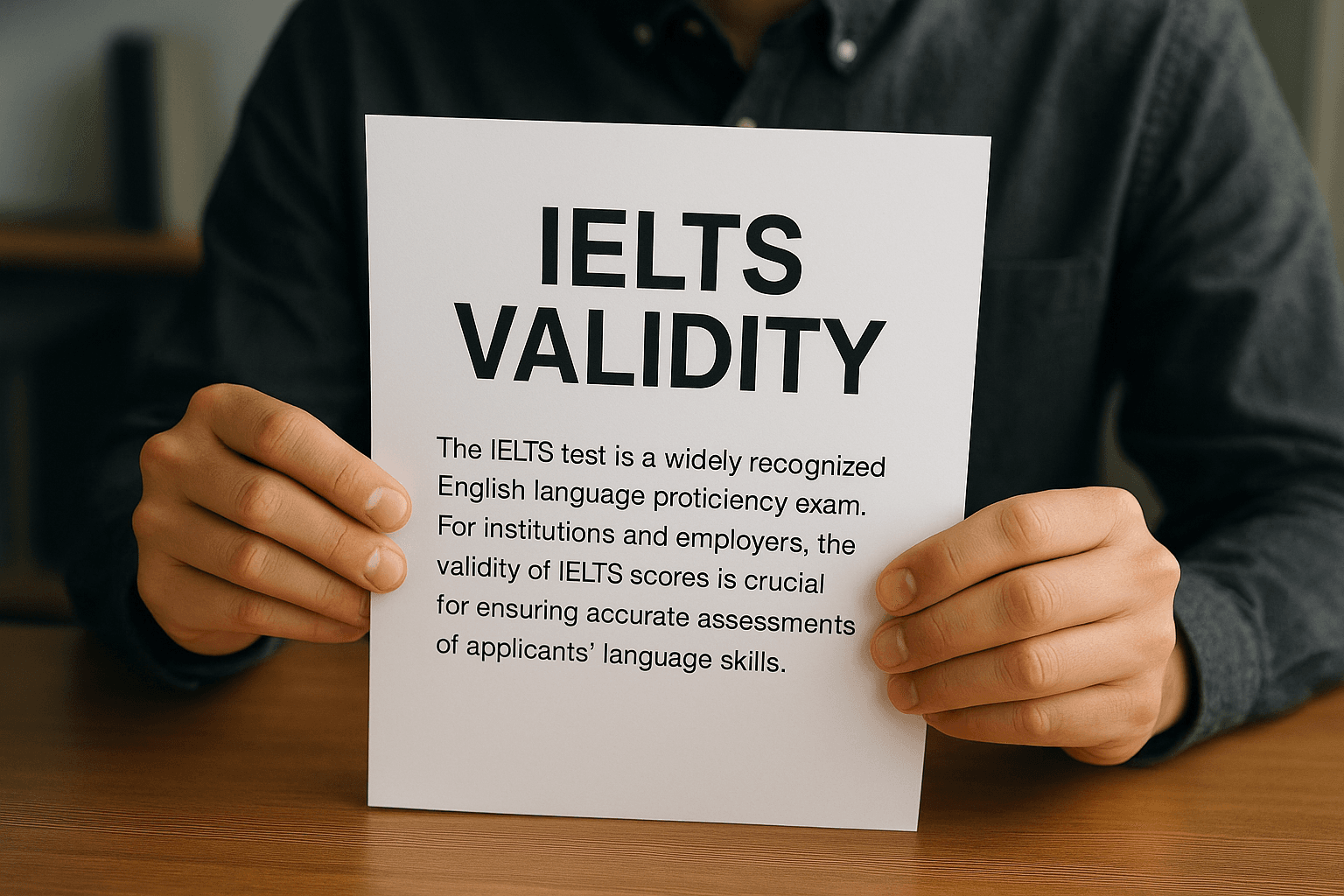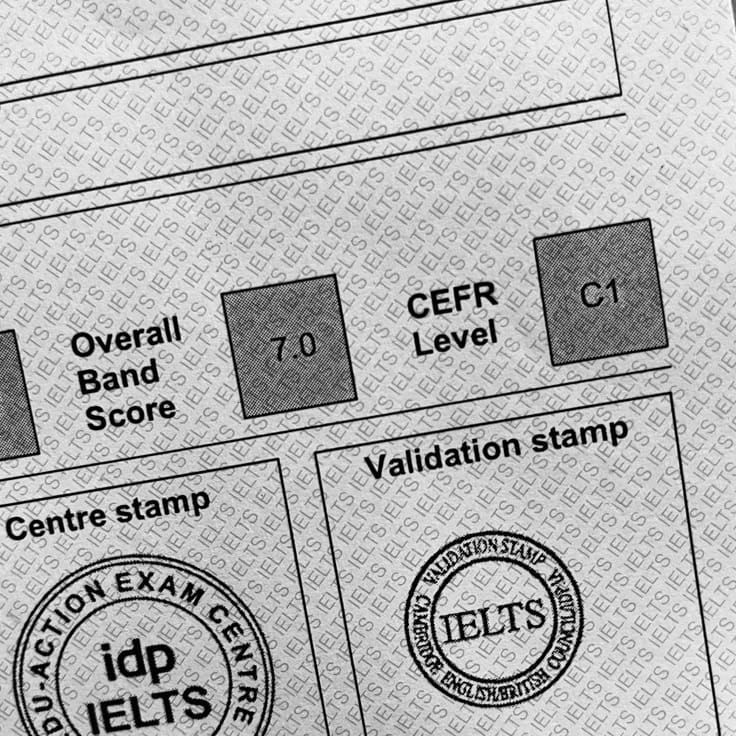Preparing for the International English Language Testing System (IELTS) is a significant undertaking. It involves countless hours of study, practice, and dedication. For many, a high IELTS score is the key that unlocks doors to international education, professional careers, and new lives abroad. However, amidst the focus on achieving the desired band score, a critical detail is often overlooked: the IELTS validity period. This single factor can determine whether your hard-earned score is accepted or rejected, potentially derailing your plans. At Bolsa25, we believe in empowering our students with comprehensive knowledge, not just language skills. This guide is designed to demystify every aspect of the IELTS score validity, ensuring your journey is as smooth and successful as possible.
What is IELTS validity?
At its core, the concept of IELTS validity refers to the specific timeframe during which your IELTS test results are considered current, accurate, and acceptable by institutions worldwide. Think of it as an expiration date for your test score. Once this period passes, your Test Report Form (TRF) is generally no longer recognized by universities, immigration bodies, and professional organizations.
The official IELTS partners—the British Council, IDP: IELTS Australia, and Cambridge Assessment English—recommend a validity period of two years from the date you took the test. This recommendation is not arbitrary; it is grounded in linguistic research. The primary justification is a phenomenon known as “second language attrition,” which suggests that a person’s language skills can decline over time if not actively used or maintained. Therefore, a two-year-old score is considered a reliable reflection of a candidate’s current English proficiency. As stated by the official IELTS organization, they “recommend that an IELTS result demonstrates a test taker’s English language ability for a maximum period of two years.” .
So, what is IELTS validity in practical terms? If you take your IELTS test on September 16, 2025, your score will be considered valid until September 15, 2027. After this date, most organizations will require you to present a new, valid score. This two-year window is the standard across most countries and for most purposes, including academic admissions, skilled migration, and professional licensing. Understanding this timeframe is the first and most crucial step in planning your application strategy effectively.
Why does understanding IELTS validity matter?
Ignoring the IELTS validity period can have significant and often costly consequences. It’s not just a minor administrative detail; it’s a hard-and-fast rule for most organizations that can make or break your application. Understanding its importance is vital for strategic planning and avoiding unnecessary stress, financial loss, and delays.

The implications of an expired score ripple across three main sectors:
- Academic Admissions: Universities and colleges have strict deadlines and even stricter requirements. Submitting an application with an expired IELTS score will almost certainly lead to its rejection. Many institutions, like the University of Memphis, explicitly state that “Test scores expire after 2 years” and will not accept them for admission decisions . This means you could miss an entire academic intake, forcing you to wait another year to apply, all while your peers are starting their studies.
- Immigration and Visas: For those seeking permanent residency or work visas, the stakes are even higher. Immigration authorities are uncompromising when it comes to documentation. For instance, Immigration, Refugees and Citizenship Canada (IRCC) for its Express Entry program clearly states that if you “apply for permanent residence with language test results that have expired, we’ll refuse your application” . A refusal means you lose your application fee and have to start the entire process over, which can be both time-consuming and emotionally draining.
- Professional Registration: Many professions, such as nursing, medicine, engineering, and law, require foreign-trained professionals to prove their English proficiency for licensing.
Ultimately, a lack of awareness about the IELTS validity period can lead to a cascade of negative outcomes: wasted application fees, missed deadlines, rejected visas, and the added pressure of having to retake the test under a tight schedule. Proper planning around your IELTS validity date is not just advisable; it’s essential for a successful outcome.
Standard validity duration of IELTS results
The universally accepted standard for IELTS validity is two years. This duration begins from the exact date you took the test, not the date your results were released. This two-year rule applies to both the IELTS Academic and IELTS General Training tests and is the benchmark used by the vast majority of the 11,000+ organizations that recognize IELTS worldwide .
However, while two years is the standard, the application of this rule can have slight variations depending on the country and the institution. It’s crucial to check the specific requirements of the organization you are applying to.
- United States: For university admissions in the USA, the IELTS validity time is strictly two years. Most American universities will not consider scores older than this period .
- United Kingdom: Similarly, universities and UK Visas and Immigration (UKVI) adhere to the two-year validity rule. For student visas and university applications, your score must be valid at the time of application.
- Canada: For both academic purposes and immigration (including the popular Express Entry system), Canada requires IELTS scores to be less than two years old at two critical junctures: when you submit your profile and when you submit your application for permanent residence.
- Australia: Australia presents a notable exception. While the two-year validity period applies for most study and work visas, the Australian Department of Home Affairs may accept IELTS scores for up to three years for certain visa subclasses, particularly for skilled migration. However, this is a specific policy change and does not apply universally. For most academic applications, the two-year rule remains the standard.
Important Note: Some elite universities, such as Oxford or Cambridge, may have even stricter requirements, sometimes preferring scores that are less than 12-18 months old at the time of application. Always verify the specific IELTS validity policy on your target institution’s official website.
Expired IELTS Scores: What Happens Next
Discovering your IELTS score has expired can be a moment of panic, especially if you are in the middle of an important application. The first question that comes to mind is whether there is any way to salvage the situation.
Can expired scores still be used?
The straightforward answer is, in most cases, no. The vast majority of universities and immigration authorities will automatically reject an expired IELTS score. There is no process to “renew” or “extend” your IELTS certificate; once it expires, it is considered invalid.
However, there are a few very rare and specific exceptions. The official IELTS partners suggest that an organization might accept a Test Report Form (TRF) older than two years if the candidate can provide proof that they have “actively maintained, or tried to improve, their English” . This could include:
- Proof of completing a degree program taught entirely in English.
- Evidence of living and working in a native English-speaking country.
It is crucial to understand that accepting such proof is entirely at the discretion of the individual institution. You cannot assume this exception will be made. For example, the University of Memphis notes that expired scores may be accepted for students who have been “continuously enrolled at a college or university in an approved English-speaking country since before the scores expired”. This is a specific institutional policy, not a general rule. Relying on such exceptions is a significant risk, and the safest path is always to have a valid score.
When and how to retake the test
If your score has expired or is about to expire before your application can be processed, retaking the test is your only reliable option. There is no waiting period required; you can register for a new test as soon as you are ready.
A recent development that can be beneficial is the IELTS One Skill Retake. This feature, available in eligible test centers, allows test-takers to retake one of the four skills (Listening, Reading, Writing, or Speaking) without having to sit for the entire exam again. This is an excellent option if you performed well in three sections but feel you could improve your score in just one. It can save time, money, and reduce the stress associated with a full retake.
Preparing for a retake, whether it’s for one skill or the full test, requires a strategic approach. This is where a dedicated preparation course can make all the difference. At Bolsa25, our approach is tailored to help you succeed. Our small group classes (max 20 students) ensure you receive personal attention from instructors. We are conversation-focused, helping you practice speaking in real-life situations, which is invaluable for the Speaking test. This focused preparation can help you not only meet but exceed your previous score, ensuring your new IELTS validity period starts with the best possible result.
IELTS Test Report Form (TRF) and Its Validity
The IELTS Test Report Form, or TRF, is the official, physical or digital document that certifies your performance on the test. It is a crucial piece of evidence in your application portfolio, and its features are directly tied to the concept of IELTS validity.
Understanding the TRF
Your TRF is more than just a piece of paper; it’s a secure document containing detailed information about your test results. Key elements on the TRF include:
- Your personal details (name, date of birth, etc.).
- A photograph for identification.
- Your test date.
- The test center number.
- Your individual band scores for Listening, Reading, Writing, and Speaking.
- Your Overall Band Score.
- A unique TRF number.
You will receive only one personal copy of your TRF (though exceptions are made for applicants to Canada and the UK, who can request two). This document is valuable, and you should keep it safe. Increasingly, test-takers who sit the IELTS on Computer test receive an electronic TRF (eTRF), which is a downloadable PDF version that serves the same official purpose.
How institutions verify the TRF within its validity period
The TRF’s unique number is the key to its verification. Institutions do not rely solely on the paper or PDF copy you provide. They use the secure IELTS Results Service, an online portal where they can input your TRF number to instantly verify the authenticity of your scores.
This is precisely why the two-year IELTS validity period is so strictly enforced. The online verification system is designed to flag scores that are outside this window. When an institution attempts to check an expired TRF, the system will indicate that the score is more than two years old. This provides a simple, secure, and standardized way for organizations to ensure they are only considering current and relevant English proficiency assessments. This process answers the question of how to check IELTS validity from an institutional perspective—it’s built directly into their verification workflow.
Common Myths About IELTS Validity
Misinformation about the IELTS test is common, and the topic of validity is no exception. Believing these myths can lead to poor planning and disappointing outcomes. Let’s debunk some of the most prevalent ones.
- Myth: You can apply for an extension on your IELTS validity.
Fact: This is unequivocally false. There is no mechanism to extend or renew an IELTS certificate. Once the two-year period is over, the score is expired, and you must retake the test to get a new, valid score. - Myth: If you receive an admission offer before your score expires, it doesn’t matter if it expires before classes start.
Fact: This is a risky assumption and depends entirely on the institution’s and the country’s visa policies. While some universities might be lenient, immigration authorities are not. For visa purposes, your score often needs to be valid at the time of visa application, not just at the time of the university’s offer. Always clarify this with both the university and the relevant visa-issuing body. - Myth: The IELTS is now valid for 3 years everywhere.
Fact: This myth stems from a specific policy change in Australia. While Australia’s Department of Home Affairs may accept scores up to three years old for certain skilled migration visas, this is an exception, not the new global rule. For academic purposes in Australia and for nearly all purposes in the US, UK, Canada, and New Zealand, the two-year IELTS validity rule remains firmly in place. - Myth: A paper copy of the TRF is enough; institutions don’t really check online.
Fact: This is dangerously incorrect. Due to the risk of fraudulent documents, virtually all reputable institutions use the online IELTS Results Service to verify every score they receive. The online verification is the definitive check of a score’s authenticity and its validity status.

Tips to Avoid IELTS Expiry Issues
Strategic planning is your best defense against the problems caused by an expiring IELTS score. By being proactive, you can ensure your hard work pays off without any last-minute hitches.
- Work Backwards from Your Deadlines: Identify the application deadlines for all the universities or immigration programs you are interested in. Plan to take your IELTS test so that the results will be comfortably valid throughout the entire application and decision-making period.
- Don’t Take the Test Too Early: While it’s good to be prepared, taking the IELTS years before you plan to apply is a common mistake. A good rule of thumb is to take the test within 12-18 months of your application submission date.
- Verify Specific Institutional Policies: Do not assume the two-year rule is the only factor. As mentioned, some top-tier universities may prefer more recent scores. Check the admissions page of each institution to understand their exact requirements regarding the IELTS validity date.
- Keep Your TRF Information Safe: Store your Test Report Form (both physical and digital copies) in a safe place. You will need the TRF number for your applications and for any future correspondence.
- Aim for Your Target Score the First Time: The best way to avoid expiry-related stress is to get the score you need on your first attempt. This eliminates the pressure of a last-minute retake. Investing in a quality IELTS preparation course, like the programs offered at Bolsa25, can significantly increase your chances of first-time success. Our focus on real-life practice and multilingual support provides a robust foundation for excelling in all four skills.
In Conclusion
The IELTS validity period is a fundamental rule of the testing system that every candidate must understand and respect. The two-year standard is designed to ensure that your score is a current and fair representation of your English language abilities. Overlooking this “expiration date” can lead to rejected applications, denied visas, and significant setbacks in your academic and professional plans.
By planning strategically, verifying specific requirements, and understanding the verification process, you can navigate the system with confidence. Remember to work backward from your deadlines, avoid taking the test too far in advance, and always aim to achieve your best score on your first attempt. With the right preparation and a clear understanding of the rules, your IELTS score will be a powerful asset, opening doors to a world of opportunities.
FAQs
Generally, no. The standard IELTS validity period remains two years for most purposes worldwide, including university admissions and immigration to countries like the UK, USA, and Canada. The three-year validity is a specific exception made by Australia’s Department of Home Affairs for certain skilled migration visa applications. It is not a universal change, and you should always assume a two-year validity unless the specific organization you are applying to explicitly states otherwise.
Yes, an overall band score of 7.5 is an excellent score. It indicates a Very Good User of English who has a full operational command of the language with only occasional unsystematic inaccuracies and inappropriacies. A score of 7.5 is highly competitive and is accepted by the vast majority of top universities and professional bodies globally, often exceeding their minimum requirements. Achieving such a high score greatly strengthens your application.
The two-year validity period is based on the linguistic principle of second language attrition.Research shows that if a person does not consistently use and practice a second language, their proficiency can decline over time. The two-year limit is considered a reasonable timeframe to ensure that the test score still accurately reflects the candidate’s current, real-world English language ability. It provides a standardized benchmark for institutions to trust that the skills demonstrated on test day are still present.
The IELTS test does not have a pass or fail mark. It is a proficiency test that provides a score on a 9-band scale. A score of 6.5 signifies a Competent User who has an effective command of the language despite some inaccuracies. Whether 6.5 is a good enough score depends entirely on the requirements of the institution or program you are applying to. Many undergraduate programs require a minimum of 6.0 or 6.5, while postgraduate programs and professional bodies often require 7.0 or higher.Is IELTS now valid for 3 years?
Is IELTS 7.5 a good score?
Why does the IELTS expire after 2 years?
Is IELTS 6.5 pass or fail?

